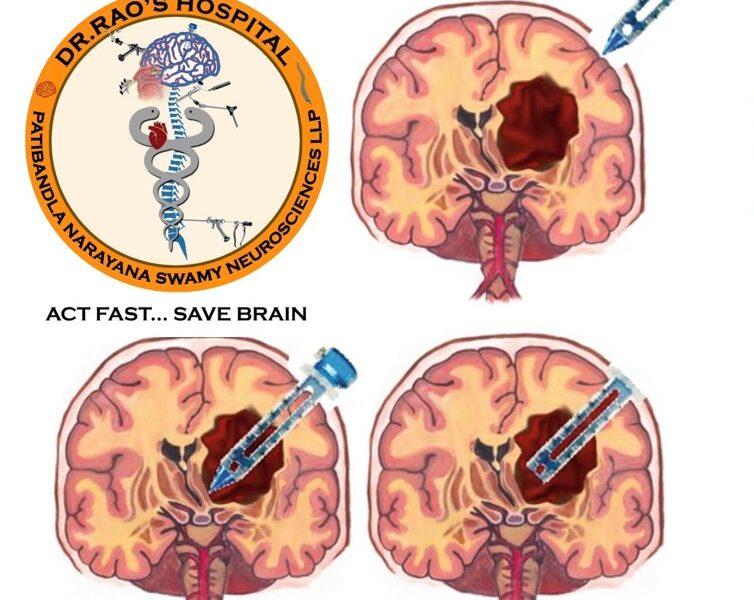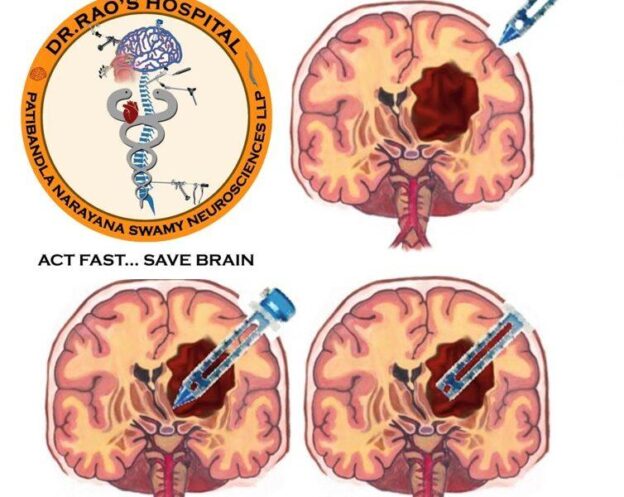The best intracranial hemorrhage treatment is at Dr Raos
Introduction
A hemorrhage is a medical emergency caused by the breaking of blood vessels. When this happens inside the skull, it is called an intracranial hemorrhage (ICH) or Brain hemorrhage.
ICH can be life-threatening because it can damage the brain and lead to death.
There are different types of ICH, depending on where the bleeding occurs in the brain.
The most common type is called an intracerebral hemorrhage (ICH), which occurs when a blood vessel in the brain bursts.
Other types of ICH include subarachnoid hemorrhage (SAH), which occurs between the brain and the membranes that cover it, and subdural hemorrhage (SDH), which occurs between the brain and its outer covering.
ICH can have many causes, including head injury, high blood pressure, stroke, and bleeding disorders.
Symptoms of ICH include headache, nausea, vomiting, seizures, drowsiness, and coma.
ICH is diagnosed with a CT scan or MRI of the head.
Treatment for ICH depends on the cause and severity of the bleed but may include surgery to remove the blood clot, medication to control blood pressure, and supportive care.
If you or someone you know has symptoms of ICH, it is essential to seek medical help immediately.
If you are looking for complete care of your cerebral or intracranial or brain hemorrhage, look no further than Dr. Raos hospital, the best neurosurgery, spine surgery, and neurology hospital in Guntur. Dr Rao is the best fellowship trained dual cerebrovascular neurosurgeon practicing in Guntur, and Call us @ 9010056444 or 9010057444 for your loved ones’ care.
Brain hemorrhage types
There are three main types of intracranial hemorrhage:
1. Subarachnoid hemorrhage occurs between the brain and the thin tissue that covers it. It is often caused by a ruptured aneurysm or head injury.
2. Intracerebral hemorrhage: This type occurs within the brain tissue. It is often caused by high blood pressure, trauma, or an underlying blood vessel disorder.
3. Subdural hemorrhage occurs between the brain and the thick membrane that covers it. It is often caused by head injury.
Brain hemorrhage causes: Intracranial hemorrhage
There are many possible causes of intracranial hemorrhage. One common cause is head trauma, which can occur due to a fall, car accident, or injury. Other possible causes include brain tumors, aneurysms, and blood vessel abnormalities. In some cases, the exact cause of the bleeding is unknown.
Brain hemorrhage Symptoms
The most common symptom of intracranial hemorrhage is a sudden, severe headache.
Other symptoms may include: -Nausea and vomiting
-Blurred vision or loss of vision
-Sensitivity to light
-Seizures
-Weakness or numbness in the arms or legs
-Difficulty speaking or understanding others
-Loss of consciousness
Brain hemorrhage diagnosis
There are a few different ways that doctors can diagnose ICH. One way is through a computed tomography (CT) scan, a type of X-ray that produces detailed brain images. Doctors may also use magnetic resonance imaging (MRI) to diagnose ICH. This technique uses magnetic fields and radio waves to produce detailed brain images. In some cases, doctors may use cerebral angiography to diagnose ICH. This procedure involves injecting a dye into the arteries that supply blood to the brain. The dye makes these arteries visible on an X-ray.
Brain hemorrhage treatment
There are a few different ways to treat intracranial hemorrhage, and the course of treatment will determine the severity of the bleeding. For a minor bleed, bed rest and pain medication may be all that is necessary. If the bleeding is more severe, surgery may be required to remove the blood and relieve pressure on the brain. In some cases, a shunt may also be placed to help drain any excess fluid from the brain.
Conclusion
In conclusion, intracranial hemorrhage can be a very serious and dangerous condition. It is important to be aware of the different types, causes, symptoms, and treatment options available. If you or someone you know is experiencing any of the symptoms associated with this condition, it is important to seek medical help immediately. If you are looking for complete care of your cerebral or intracranial or brain hemorrhage, look no further than Dr. Raos hospital, the best neurosurgery, spine surgery, and neurology hospital in Guntur. Call us @ 9010056444 or 9010057444 for your loved ones’ care.


